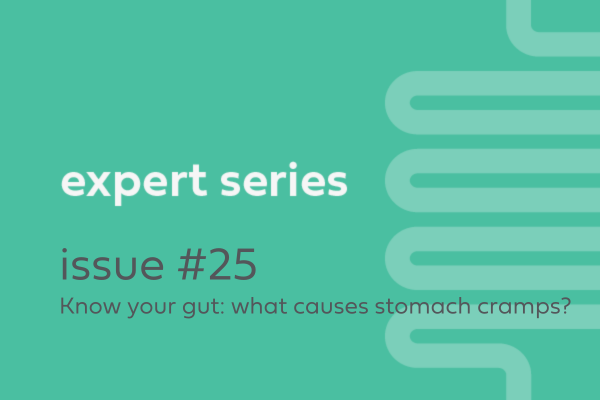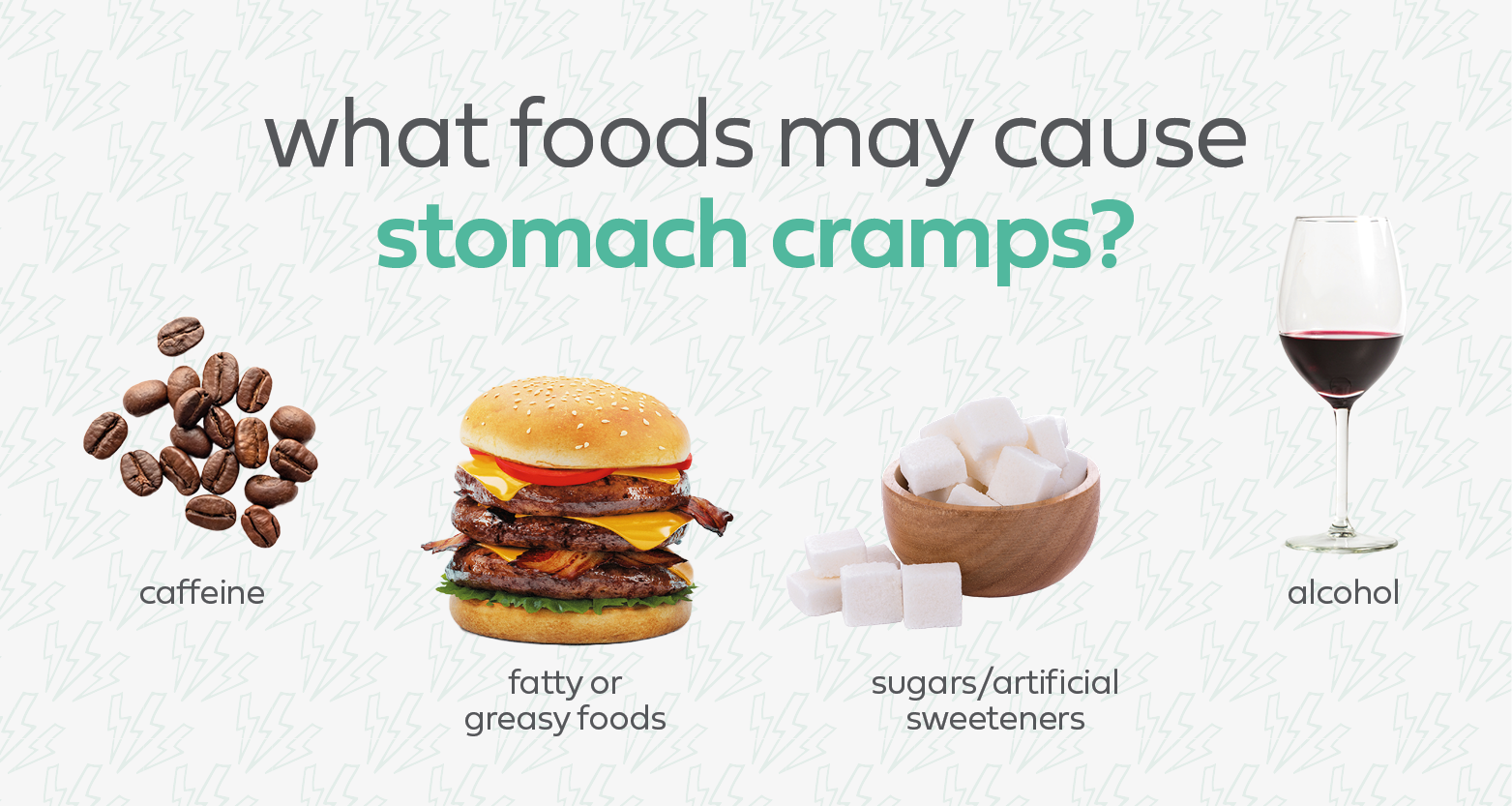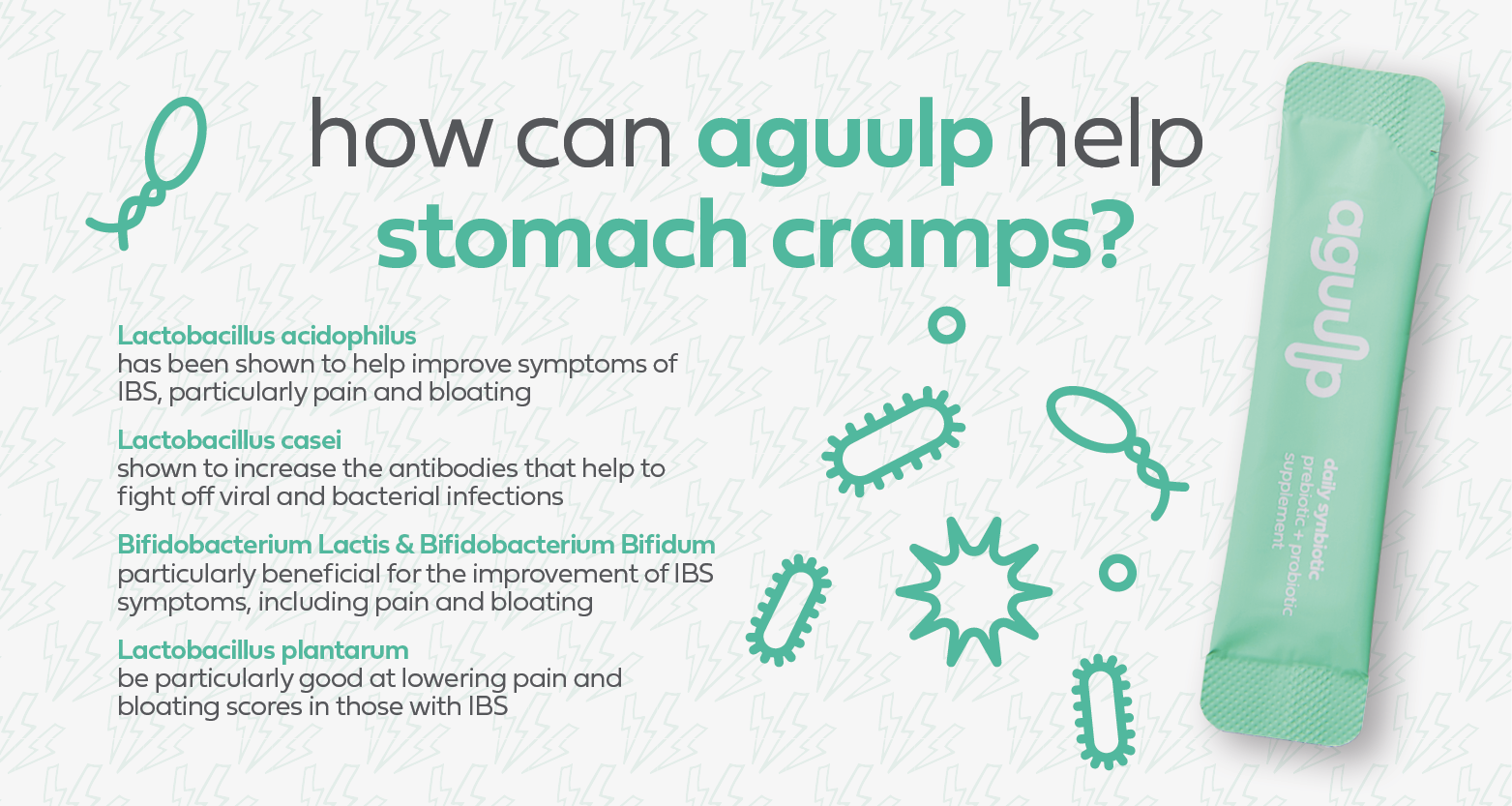Know your gut: what causes stomach cramps?

At aguulp, we prioritise a symptom-first approach and emphasise the significance of understanding common gut symptoms, like what causes stomach cramps. By gaining insight into these symptoms, we can offer expert advice and continue to develop and improve high-quality supplements to address them.
Here, we dive into the root causes of stomach cramps, including digestive issues and dietary triggers, while providing valuable tips on prevention and management.
What are stomach cramps?

Stomach cramps are also known as ‘stomach ache’, ‘tummy ache’, or ‘tummy pain’ and are often described as a sudden, uncontrolled, tight feeling in the muscles of the abdomen.
Why is my stomach cramping?
Stomach cramps can occur for many reasons and most people will experience stomach cramps at some point. In most cases, experiencing stomach cramps is not indicative of a serious health problem, especially if they disappear on their own and are only short lived.
Factors behind what causes stomach cramps may include:
1. Build-up of gas in the abdomen
A build-up of gas is one of the most obvious and common reasons for stomach cramps, which is the reason why cramps are often accompanied by other digestive symptoms such as bloating, flatulence, and constipation.
2. Indigestion
Sometimes, indigestion is what causes stomach cramps, possibly due to the consumption of too much food or foods that may irritate the digestive tract. This may lead to a feeling of fullness, bloating, heartburn and even feeling sick.
3. Food poisoning or viral infection (Gastroenteritis)*
This is often accompanied by loose stools and/or diarrhoea, and it’s commonly known as gastroenteritis, a condition where the lining of the digestive tract is inflamed. Gastroenteritis is usually caused by the consumption of contaminated food or the passing of a viral infection from person to person.
4. Irritable Bowel Syndrome (IBS)*
In particular the IBS-D type can lead to stomach cramps – this is a subset of IBS but with diarrhoea being the prominent symptom.
*The main difference between the two is that gastroenteritis tends to resolve itself after a short period of time, whereas the symptoms of IBS, such as the stomach cramping, can be intermittent or ongoing with occasional extended periods of relief interspersed with flare-ups.
5. Food Intolerances
Food intolerances are also believed to be a contributing factor behind what causes stomach cramps. One of the most common food intolerances associated with abdominal cramping is dairy, which often occurs as a result of the body being unable to digest lactose.
When the body is unable to break down lactose, usually due to a lack of lactase enzymes, it is metabolised by bacteria in the gut which produce by products such as gas and short chain fatty acids. This fermentation process can lead to cramping, bloating, flatulence, and diarrhoea in those who have a reduced capacity to digest lactose.
6. Small Intestinal Bacterial Overgrowth (SIBO)
This is where excessive amounts of bacteria reside in the small intestine. Increased bacterial fermentation of food as it enters the stomach leads to increased gas production, resulting in symptoms similar to that of lactose intolerance and IBS including bloating, abdominal cramps, and diarrhoea.
7. Abnormal motor function
Studies show that intestinal contractions (abdominal cramps) may be associated with the sensation of pain in IBS sufferers. What’s more, it’s thought that the colon muscle tends to contract more in people with IBS compared to people without the condition.
8. Nerves in the digestive system
Often implicated in IBS sufferers, the nerves may be over-sensitive to changes that typically occur during the digestive process. For example, when the abdomen stretches as a result of too much gas or stool present, this can result in perceptions of pain and discomfort, and may be what causes stomach cramps for some people.
9. Stress and anxiety
The gut and the brain are intimately connected and when we are stressed, the digestive system doesn’t function as optimally as it should and therefore digestive processes are affected.
In this event, the release of stomach acid and digestive enzymes needed to digest food molecules can be inhibited, resulting in increased levels of bacteria being fermented and the formation of acids and gases that lead to bloating, cramping and, in some cases, diarrhoea. Read more about the gut-brain axis.
Enjoying this article? Sign up to our Expert Series newsletter here to receive in-depth, expert-led articles on all things health, straight to your inbox every Sunday.
What causes stomach cramps? Foods to avoid

In reality, any food can cause ‘stomach cramps’; for example, if we consume too much food at once, this can cause the digestive system to be overwhelmed, while if the body is unable to tolerate certain foods due to intolerances, this can lead to cramps too. However, there are certain groups of foods that are associated with the potential to cause abdominal cramping and these may include (but are not limited to)
- Spicy foods
- Alcohol: wine and beer
- Caffeine
- Fatty or greasy foods
- Gluten
- Dairy/lactose containing foods: milk, cheese and yoghurts
- Foods that are not cooked or stored correctly: resulting in bacterial contamination. Common culprits include seafood, raw or undercooked meat, poultry and eggs
- Yeast: foods that contain yeast can contribute to the overgrowth of yeast in the gut, leading to bloating, excessive gas, and intestinal cramping. Sources include: aged cheeses, bread, cakes and pastries, dried fruits
- Certain sugars and artificial sweeteners: certain sugars such as fructose and sorbitol are known to be poorly absorbed in the intestines and can sometimes be behind what causes stomach cramps and even diarrhoea
- Raw vegetables: some raw vegetables can be difficult to digest by those who may be lacking certain digestive enzymes, which results in bacterial fermentation. Cooking vegetables prior to eating can help to reduce these symptoms
- High FODMAP foods: foods that are high in Fermentable Oligosaccharides, Disaccharides, Monosaccharides, and Polyols (known as FODMAPS) can be more difficult to digest for some people, resulting in increased bacterial fermentation
How to stop stomach cramps
Knowing how to stop stomach cramps can help you to relieve discomfort and improve your gut health. From staying hydrated to eating the right foods, keep in mind these tips for relieving stomach cramps next time you’re struggling:
Drink plenty of water: studies have shown that dehydration is a potential cause of stomach pain. Dehydration can lead to constipation, which can cause bloating and stomach cramps
Chew your food properly: aim for a minimum of 15 chews per mouthful to enable the body to produce important digestive enzymes to help break down and digest food properly
Identify potential food intolerances/sensitivities: keeping a food diary can help you to identify any trigger foods
Eat small but regular meals: large meals can over-stimulate the bowel, which can lead to cramping and other symptoms
Minimise highly processed and refined foods: these tend to contain high amounts of sugar, which feed bad bacteria in the gut causing stomach cramps. Read more about good gut bacteria vs bad gut bacteria
Drinking peppermint or chamomile tea: peppermint is renowned for its antispasmodic effects and ability to expel air, helping to reduce gas and bloating that may be contributing to abdominal pain and discomfort. Chamomile tea has calming properties that can help to relax the stomach muscles, reducing the pain of cramping and spasms. Avoid drinking this immediately after large meals – wait for about half an hour after eating
Manage stress: as the gut and the brain are intimately connected, managing stress can reduce unpleasant symptoms, such as pain and discomfort
Reduce/eliminate fibre or high FODMAP foods: eliminate or reduce fibre content for a short period of time and then add it back into the diet gradually
Ensure food is cooked thoroughly before eating: particularly meat, poultry, and eggs
Try waiting at least 2 hours after eating before lying down: lying down too soon after eating may cause heartburn and abdominal pain
Eat a varied diet: to encourage diversity of the gut microbiome
How to stop stomach cramps with help from aguulp

A probiotic supplement such as our aguulp Daily Synbiotic (which contains liquid probiotics and prebiotics) can help to rebalance and restore levels of good bacteria in the gut. It can therefore reduce the build-up of excessive gas that’s produced as a by-product from the less healthy bacteria in the gut, helping to minimise the pain and discomfort that can accompany abdominal bloating.
Lactobacillus acidophilus is one of the most researched strains of probiotics and has been shown to help improve symptoms of IBS, particularly pain and bloating.
Strains of Lactobacillus casei have been shown to increase the antibodies that help to fight off viral and bacterial infections.
Research shows that strains of Bifidobacterium Lactis and Bifidobacterium Bifidum are particularly beneficial for the improvement of IBS symptoms, including pain and bloating.
Strains of Lactobacillus plantarum have been shown in studies to be particularly good at lowering pain and bloating scores in those with IBS.
Studies have shown a positive relationship between probiotics and lactose intolerance. Lactobacillus acidophilus and Lactobacillus reuteri have been shown to be specifically effective as a treatment option for lactose intolerance.
Start to look after your gut health better and explore our full collection of liquid gut health supplements.
